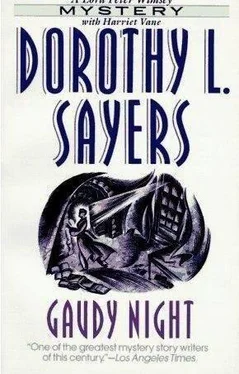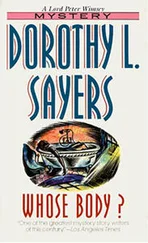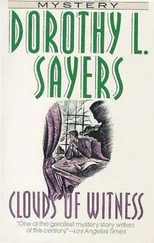Dorothy Sayers - Gaudy Night
Здесь есть возможность читать онлайн «Dorothy Sayers - Gaudy Night» весь текст электронной книги совершенно бесплатно (целиком полную версию без сокращений). В некоторых случаях можно слушать аудио, скачать через торрент в формате fb2 и присутствует краткое содержание. Жанр: Детектив, на английском языке. Описание произведения, (предисловие) а так же отзывы посетителей доступны на портале библиотеки ЛибКат.
- Название:Gaudy Night
- Автор:
- Жанр:
- Год:неизвестен
- ISBN:нет данных
- Рейтинг книги:4 / 5. Голосов: 2
-
Избранное:Добавить в избранное
- Отзывы:
-
Ваша оценка:
- 80
- 1
- 2
- 3
- 4
- 5
Gaudy Night: краткое содержание, описание и аннотация
Предлагаем к чтению аннотацию, описание, краткое содержание или предисловие (зависит от того, что написал сам автор книги «Gaudy Night»). Если вы не нашли необходимую информацию о книге — напишите в комментариях, мы постараемся отыскать её.
Gaudy Night — читать онлайн бесплатно полную книгу (весь текст) целиком
Ниже представлен текст книги, разбитый по страницам. Система сохранения места последней прочитанной страницы, позволяет с удобством читать онлайн бесплатно книгу «Gaudy Night», без необходимости каждый раз заново искать на чём Вы остановились. Поставьте закладку, и сможете в любой момент перейти на страницу, на которой закончили чтение.
Интервал:
Закладка:
“Very unfortunate, miss, that is.”
“In brown paint.”
“That’s awkward, miss.”
“It will have to be cleaned at once, before anybody sees it.”
“Very good, miss.”
“And then we shall have to get hold of the decorators or somebody to paper or wash it over before the Chancellor arrives.”
“Very good, miss.”
“Do you think you can manage it, Padgett?”
“Just you leave it to me, miss.”
Harriet’s next job was to collect Miss Burrows, who received the news with loud expressions of annoyance.
“How loathsome! And do you mean to say all those books have got to be done again? Now? Oh, lord, yes-I suppose there’s no help for it. What a blessing I hadn’t put the Folio Chaucer and the other valuables in the show-cases. Lord!”
The Librarian scrambled out of bed. Harriet looked at her feet. They were quite clean. But there was an odd smell in the bedroom. She traced it after a moment or two to the neighborhood of the permanent basin.
“I say-is that turps?”.
“Yes,” replied Miss Burrows, struggling into her stockings. “I brought it across from the library. I got paint on my hands when I moved those pots and things.”
“I wish you’d lend it me. We had to scramble in through the window over a wet radiator.”
“Yes, rather.”
Harriet went out, puzzled. Why should Miss Burrows have bothered to bring the can over to the New Quad, when she could have cleaned off the paint on the spot? But, she could well understand that if anyone had wanted to remove paint from her feet after being disturbed in the middle of a piece of to work, there might have been nothing for it but to snatch up the can and bolt for it.
Then she had another idea. The culprit could not have left the Library with her feet bare. She would have put on her slippers again. If you put paint-stained feet into slippers, the slippers ought to show signs of it.
She went back to her own room and dressed. Then she returned to the New Quad. Miss Burrows had gone. Her bedroom slippers lay by the bed. Harriet examined them minutely, inside and out, but they were quite free from paint. On her way back again, Harriet overtook Padgett. He was walking sedately across the lawn, carrying a large can of turpentine in each hand.
“Where did you rake that up, Padgett, so early in the morning?”
“Well, miss, Mullins went on his motor-bike and knocked up a chap he knows what lives over his own oil-shop, miss.”
As simple as that.
Some time later, Harriet and the Dean, decorously robed and gowned, found themselves passing along the East side of Queen Elizabeth Building in the wake of Padgett and the decorators’ foreman.
“Young ladies,” Padgett was heard to say, “will ’ave their larks, same as young gentlemen.”
“When I was a lad,” replied the foreman, “young ladies was young ladies. And young gentlemen was young gentlemen. If you get my meaning.”
“Wot this country wants,” said Padgett, “is a ’Itler.”
“That’s right,” said the foreman. “Keep the girls at ’ome. Funny kind o’ job you got ’ere, mate. Wot was you, afore you took to keepin’ a ’en ’ouse?”
“Assistant camel ’and at the Zoo. Very interesting job it was, too.”
“Wot made you chuck it?”
“Blood-poison. I was bit in the arm,” said Padgett “by a female.”
“Ah!” said the foreman decorator.
By the time Lord Oakapple arrived, the Library presented nothing unseemly to the eye, beyond a certain dampness and streakiness in its upper parts, where the new paper was drying unevenly. The glass had been swept up and the paint stains cleaned from the floor; twenty photographs of classical statuary had been unearthed from a store-cupboard to replace the Colosseum and the Parthenon; the books were back on their shelves, and the showcases duly displayed the Chaucer Folio, the Shakespeare First Quarto, the three Kelmscott Morrises, the autographed copy of The Man of Property, and the embroidered glove belonging to the Countess of Shrewsbury. The Dean hovered about the Chancellor like a hen with one chick, in a martyrdom of nervous apprehension lest some indelicate missive should drop from his table-napkin or flutter out unexpectedly from the folds of his robes; and when, in the Senior Common Room after lunch, he took out a bunch of notes from his pocket and riffled them over with a puzzled frown, the tension became so acute that she nearly dropped the sugar-basin. It turned out, however, that he had merely mislaid a Greek quotation. The Warden, though the history of the Library was known to her, displayed her usual serene poise.
Harriet saw nothing of all this. She spent the whole interval, after the decorators had done their part, in the Library, watching the movements of everyone who came in or out, and seeing that they left nothing undesirable behind them. Apparently, however, the College Poltergeist had shot its bolt. A cold lunch was brought up to the self-appointed invigilator. A napkin covered it; but nothing lurked beneath its folds beyond a plate of ham sandwiches and other such harmless matter. Harriet recognized the scout.
“It’s Annie, isn’t it? Are you on the kitchen staff now?”
“No, madam. I wait upon the Hall and Senior Common Room.”
“How are your little girls getting on? I think Miss Lydgate said you had two little girls?”
“Yes, madam. How kind of you to ask.” Annie’s face beamed with pleasure. “They’re splendid. Oxford suits them, after living in a manufacturing town, where we were before. Are you fond of children, madam?”
“Oh, yes,” said Harriet. Actually, she did not care much about children-but one can scarcely say so, bluntly, to those possessed of these blessings. “You ought to be married and have some of your own, madam. There! I oughtn’t to have said that-it’s not my place. But it seems to me a dreadful thing to see all these unmarried ladies living together. It isn’t natural, is it?”
“Well, Annie, it’s all according to taste. And one has to wait for the right person to come along.”
“That’s very true, madam.” Harriet suddenly recollected that Annie’s husband had been queer, or committed suicide, or something unfortunate, and wondered whether her commonplace had been a tactful one. But Annie seemed quite pleased with it. She smiled again; she had large, light blue eyes, and Harriet thought she must have been a good-looking woman before she got so thin and worried-looking. “I’m sure I hope he’ll come along for you-or perhaps you are engaged to be married?”
Harriet frowned. She had no particular liking for the question, and did not want to discuss her private affairs with the college servants. But there seemed to be no impertinent intention behind the inquiry, so she answered Pleasantly, “Not just yet; but you never know. How do you like the new Library?”
“It’s a very handsome room, isn’t it madam? But it seems a great shame to keep up this big place just for women to study books in. I can’t see what girls want with books. Books won’t teach them to be good wives.”
“What dreadful opinions!” said Harriet. “Whatever made you take a job in a women’s college, Annie?”
The scout’s face clouded. “Well, madam, I’ve had my misfortunes. I was glad to take what I could get.”
“Yes, of course; I was only joking. Do you like the work?”
“It’s quite all right. But some of these clever ladies are a bit queer, don’t you think, madam? Funny, I mean. No heart in them.”
Harriet remembered that there had been misunderstandings with Miss Hillyard.
“Oh, no,” she said briskly. “Of course they are very busy people, and haven’t much time for outside interests. But they are all very kind.”
Читать дальшеИнтервал:
Закладка:
Похожие книги на «Gaudy Night»
Представляем Вашему вниманию похожие книги на «Gaudy Night» списком для выбора. Мы отобрали схожую по названию и смыслу литературу в надежде предоставить читателям больше вариантов отыскать новые, интересные, ещё непрочитанные произведения.
Обсуждение, отзывы о книге «Gaudy Night» и просто собственные мнения читателей. Оставьте ваши комментарии, напишите, что Вы думаете о произведении, его смысле или главных героях. Укажите что конкретно понравилось, а что нет, и почему Вы так считаете.












